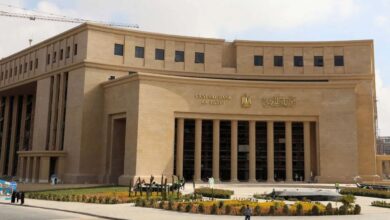A 43-year-old single mother, identified in press reports as Seham Abdel-Salam, throttled her son to death with a towel, then wrote a suicide note before slitting her own wrists.
But Abdel-Salam didn’t die. Instead, she bled for six hours, her child’s corpse laying nearby, where she left it for three days before turning herself in. After confessing to the authorities, she reportedly begged police to be granted a death sentence.
“I want to be relieved of my life,” she pleaded.
Jobless and without money, Abdel-Salam had decided to take her own life. But worried how her nine-year-old son would survive without her, she had decided to kill him as well, according to statements given to the police, so she suffocated him with a wet towel.
In her suicide note, she wrote of the suffering she had endured due to extreme financial difficulties. Killing herself, she wrote, was her only way out.
Abdel-Salam is one of many Egyptians who has tasted the humiliation and depression associated with abject poverty. And for most such cases, help from the government is seldom if ever forthcoming.
In the past, those struggling with poverty could rely on informal social safety nets, often finding work in the informal sector. But in light of current economic conditions in Egypt, even this type of parallel economy “can’t stand alone,” said Nagla Rizk, economy professor at the American University in Cairo.
“The institutional setup should provide unemployment benefits, government safety nets, social insurance and compensation packages in the case of layoffs,” she said. “But because these were not available, people resorted to the informal sector. But this, too, now seems unsustainable under the harsh conditions we’re enduring.”
Rizk told Al-Masry Al-Youm that cases of suicide such as Abdel-Salam’s represented “a failure of Egyptian economic and political institutions.”
“It shows that people have given up on the government. Formal channels are blocked,” she explained. “Those who can get their rights back by force or through endless strikes and protests do. But there remains a margin who are not empowered enough to find a solution other than suicide.”
Unfortunately, Abel-Salem’s case is hardly unique.
In May of last year, 23-year-old junior policeman Milad Fahmy set himself on fire after his church refused to lend him money for medical treatment. Four months earlier, an unemployed man jumped off of his balcony with his three-year-old daughter in his arms, killing both of them. He did so following an argument with his wife over money issues.
According to the World Health Organization, the suicide rate in Egypt in 2009 reached 87 per 100,000 people. Yet it remains unclear how many of these had been the result of poverty. Local studies of the phenomenon, meanwhile, remain difficult to obtain.
Madiha El-Safty, a sociology professor at the American University in Cairo, says that poverty-related suicide did not yet represent a “trend” per se, but that it was “definitely increasing.”
“Poverty in our society has never reached this level; the percentage [of those committing suicide due to poverty] has never reached these proportions,” she said. “It has nothing to do with politics or oppression–despair is what leads the mother to do this. The reasons are limited to poverty. The priority for this segment of society is mere survival.”
Abdel-Salam’s case landed on the crime pages of some local newspapers, but received scant attention from government officials.
In a telephone interview with Al-Masry Al-Youm, Mohammad Kamal, spokesman for the ruling National Democratic Party, said he was “not familiar with the details of the case.”
When asked about rising cases of poverty-related suicides, he responded by noting that the party had a program specifically devoted to poverty alleviation. “Fighting poverty is embedded in the main policies of the party,” said Kamal. “It doesn’t ignore the fact that it’s a problem, but the program has not touched everyone.”
Indeed it hasn’t. According to official statistics from 2009, over 23 percent of Egyptians live below the poverty line, earning less than US$2 per day. The national unemployment rate, meanwhile, increased from 8.7 percent in 2008 to 9.4 percent last year. Human rights advocates, for their part, say the figure is much higher.
Sarah Sabry, a researcher at the University of London’s School of Oriental and African Studies, recently published a study on how poverty was “misrepresented” in Egypt. Questioning the validity of official data on poverty, Sabry juxtaposed them against the real costs of basic food and non-food commodities and concluded that “the incidence of poverty is considerably underestimated.”
What’s more, available statistics on poverty do not include less extreme cases of people who can barely make ends meet, who are forced to withdraw their children from school, or who can only get by with the help of charity and other social support networks.
“What is the reason for poverty? Are there jobs or not? And if there aren’t for some people, the reason could be because these people are not developing their skills,” said Kamal. “Part of the problem has to do with the individual. It’s a complicated issue, which we can’t just blame on the government.”
Kamal went on to suggest that the role of civil society, charities and non-governmental organisations may have declined, “or maybe they’ve become disinterested.” While Kamal concedes this is just a hypothesis, she asserts that government should refrain from interfering in the work of civil society.
Human rights advocate and lawyer Negad el-Borai, for his part, says the ultimate cause of the problem is simple: “uneven distribution of wealth.”
“The state doesn’t implement equitable economic policies. We need a redistribution of wealth–progressive taxes of up to 60 percent on the wealthy businessmen who make millions,” he said. “The government is talking about lifting subsidies, and their safety nets are already useless. We need middle- and low-income housing instead of luxury suburban housing on land granted almost for free for investors.”
El-Borai added: “None of this will happen, of course, because we have a gang of thieves in control instead of a government.”




